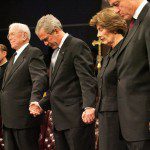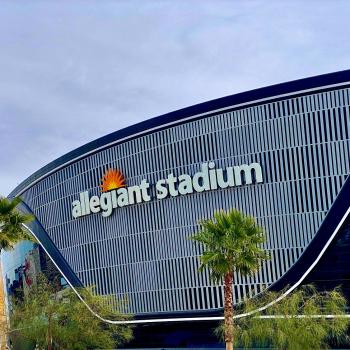Q: You are preaching often in the public square. You gave a sermon at the Democratic National Convention. What would you say to pastors about the role and responsibility of being a preacher in public in America today?
When I was doing my doctoral work at Drew, I ran across a book called “Pastoral Care and Liberation Theology” that made the case that not to be concerned about public policy was to be engaged in a form of pastoral malpractice. Because it is an attempt to think that somehow we can minister to people inside the church without knowing the situations or confronting the situations that are causing many of their pastoral needs inside the church.
We can’t ignore the social realities. It’s not biblical; it’s not gospel.
As Dr. William Turner once taught us, however you describe your conversion — born again, saved, baptized, washed in the blood, redeemed — if what follows is not a critique and a quarrel with the world, then the qualification of that conversion remains terribly suspect.
But I will say that in the public square you have to work hard at having a cadre of people to hold you responsible so that you do not just become an orator in the public square.
If you’re going to be in the public square as a preacher, you have to bring something different. So, for instance, you’ll never hear me in the public square talking about left and right, and Conservative vs. Democrat. You have to bring to bear the sacred text in the public square.
I’ve often been asked if I would speak on a program but not lift up the Scriptures. I have to decline. And I would say to any preacher, you ought to decline if that’s the requirement.
Even at the DNC, I had to be very clear about what I would do and what I would not do. Because at the end of the day, we are held accountable for the gospel we preach. And the gospel requirement is clear that we can never operate in such a way that we say that God is, for instance, a Democrat or a Republican.
So, for instance, at the DNC, I attempted to lift up the deep moral values of our faith, and of our Constitution, and talk more about the heart of the nation rather than a particular candidate.
And so when I spoke at the Democratic Convention, I laid out a series of issues — poverty, health care, how we treat one another, how we treat immigrants — and I made it clear that I follow the brown-skinned Palestinian Jew named Jesus.
And I used a very particular word. I said we should in this moment “embrace” Hillary Clinton.
Embracing is more about brotherhood and sisterhood than a political relationship. When you embrace somebody, you remain who you are. You don’t have to give up who you are. When you embrace them, you also embrace them in such a way that not only can you encourage them, but if necessary, you can edify them, and you can even critique them.
But also with an embrace, you can, if you will, “un-embrace” if someone chooses to move in ways that are counter to the deep religious and moral callings of our faith.
And a lot of people in the nation heard that, Jonathan, and appreciated it. I’ve met a lot of people since then in airports and on trains who’ve said, “Thank you for using that language. Thank you for lifting up the metaphor of the heart.” The metaphor of the heart is heavily used in the Scriptures.
I think we have to be in the public square. But we also have to be in the public square where we bring something other than the normal kind of divisiveness, and partisanism, and mere left/right conservative vs. liberal arguments.
Q: Would you say that preachers have a distinct role to play in the church’s work in the public square, as opposed to laypeople?
Jesus didn’t just do ministry by himself. But Jesus in fact had apostles, and then they continued training people in the apostles’ doctrine.
If you look at all of the social movements throughout our country — abolition movement, social gospel movement, civil rights movement — they weren’t just about individuals. There were persons who trained, who thought through, who wrestled with policy and theology.
So the more political-organizing leadership — institutes and summits that we have with 50 to 100 clergy and activists and public-policy persons — I think this is a model for the nation right now.
My daughter has a degree in public health; I often say we should have degrees in public theology. And we have to make sure that we have this level of engagement where we do what I call moral analysis, moral articulation and moral activism.
In the same space we can set our deepest religious values around justice, mercy, love and truth, put that right beside our policy challenges, and then put that right beside our strategic plans for engaging.
And I think that allows us to raise the question when we look at policy, not Democrat or Republican, but we ask three questions: Is this policy morally defensible? Is it constitutionally consistent? Is it economically sane?
And I think, now more than ever, we have to have schools of prophets that are nontraditional. Yes, some of them we should have in our seminaries — a master of public theology — but beyond that, we need places where people can come together, particularly clergy, particularly pastors, and be trained and retrained, tooled and retooled. It is of the utmost importance.
And we’ve had phenomenal receptivity to this all over the country, wherever we’ve gone to do these one-day, two-day trainings.
Q: What would you say to pastors who are preaching during this election season and the seminaries that are creating students during the election? What word would you have for them?
I would tell them that we need a good IT program. Now you know in college they call that “information technology.” But I call it “issues and turnout.”
The issues that I believe Christ would have us be concerned about are the very ones that he lifted up in his first public sermon: the poor, the sick, the imprisoned, the bruised, the broken, the blind, and all of those who have been made to feel unacceptable.
But now, who are they? And what policies impact their lives? What issues impact their lives? Well, who are the poor today? Who are the brokenhearted? Who are the ones made to feel unacceptable? And we should then look at candidates based on examination of these policies. That’s the issue side.
And we’ve provided a way at www.moralrevival.org or www.breachrepairers.org. We’ve said to all of the candidates — presidential, gubernatorial, senatorial — “We need something higher, something that’s not just rooted in ‘how can you beat somebody and distort the record.’”
We know we do not elect perfect people. That’s not even an issue for us. We understand that we all need, certainly, God’s grace. But the question becomes, where do the policies of particular individuals line up in relationship with the moral concerns that Jesus and the prophets lifted up? We have to do a serious examination on that.
Then second, we have to have turnout. I say to every preacher, white or black, we should be reminded that white and black, Jews and Christians left the Brown Chapel AME Church in Selma for Montgomery on a Sunday together, hand in hand.
They were beaten on the Edmund Pettus Bridge on a Sunday. They were almost killed on a Sunday. They were driven back to the church on a Sunday. And they made their commitment to go back and march again on a Sunday, as they fought for voting rights.
So voting rights, the right to vote, the access to the ballot is a right written in the blood of the martyrs.
Because actually, to deny someone the right to vote is in a sense to deny their imago Dei, their image of God. In order to vote, you have to be a citizen, 18 years of age or older, born or naturalized in the United States of America. In order to be born or naturalized, in order to be a citizen, you have to be a person. And in our theology, in order to be a person, you have to be created by God.
So if I deny your right to vote, then I’m questioning whether or not you’re created by God, or if you are of the same humanity.
Now, some people say, “No, Rev. Barber, that’s a stretch.” Well actually, the reason African-Americans were written as three-fifths of a person in the original Constitution and were denied the right to vote is because they were not seen as full human beings. They were seen as subpar human beings. And poor whites who didn’t own land were seen as subpar human beings.
So people of faith should be highly focused on turnout, and on a turnout rooted in the deepest moral values of our faith, because any attempt to undermine the right to vote is a direct affront to the imago Dei in every person. I believe that.













